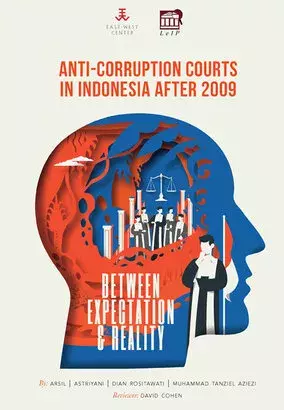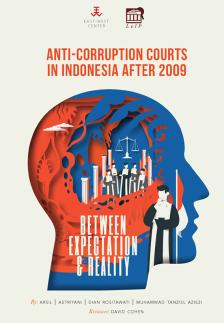Error message

Study affirms widely held perception that regional corruption courts aren’t living up to the standard set by a well-regarded national court
JAKARTA (Oct. 21, 2021) — A new report published by the Indonesian Institute for Independent Judiciary (LeIP) and the East-West Center (EWC) has affirmed the widely held public perception that Indonesia’s regional Anti-Corruption Courts are not living up to the standard previously set by a well-regarded single national court before the system was expanded to more than 30 regional capitals in 2009. Employing both quantitative and qualitative methods, the report, titled Anti-Corruption Courts in Indonesia after 2009: Between Expectation and Reality, demonstrates that the regional courts’ failings are the result of the strains placed upon them after the too-rapid expansion and lays out recommendations for reforms to address the current shortcomings of anti-corruption adjudication in Indonesia.
In-depth analysis

The report’s authors conducted in-depth analysis of important issues such as the roles of ad hoc and career judges, management, training, selection, certification, competence, infrastructure, budget, and more.
“There have been many studies discussing the Anti-Corruption Court in Indonesia,” writes LeIP Executive Director Liza Farihah in her introduction to the study. “However, there has not been a comprehensive study of the Anti-Corruption Court from an institutional perspective that also highlights the issues of human resources, budgeting, and infrastructure, in addition to highlighting the issues of legal framework and decisions of the court.”
“One of the important features that sets this report apart from many other critical assessments of the Anti-Corruption Courts is its systematic nature,” adds noted international law scholar David Cohen in his preface. “The report is not driven by focusing on particular cases or scandals, but rather on the operation of the system which largely determines the overall quality and performance of the courts. … As such, it should be required reading for parliamentarians, judicial actors at all levels, civil society observers, and policymakers in all relevant branches of government.”
Recommendations for reform
The report is part of a four-year collaborative project by the EWC-based Partnership for Human Rights and LeIP, with funding from the Siemens Integrity Initiative, to address some of the most critical issues in the ongoing efforts to combat endemic corruption in Indonesia. The authors’ recommendations for Anti-Corruption Courts reform include:
- Keeping the courts at the provincial level, without replicating them at the district or city level
- Enhancing access to Anti-Corruption Courts by allowing court sessions at the nearest District Court
- Maximizing the utilization of certified career judges
- Developing a data-driven system to manage judges’ workloads
- Strengthening the Anti-Corruption Judge Certification training system
- Reinforcing specialization requirements for ad hoc judges
- Increasing staffing for court registrars, who oversee case administration and management
The East-West Center, based in Honolulu, Hawai‘i and Washington, DC, promotes better relations and understanding among the people and nations of the United States, Asia, and the Pacific through cooperative study, research, and dialogue. Established by the US Congress in 1960, the Center serves as a resource for information and analysis on critical issues of common concern, bringing people together to exchange views, build expertise, and develop policy options.
Founded in Jakarta in 1999 by a group of practitioners and legal observers, the Institute for Research and Advocacy for the Independence of the Judiciary (LeIP) is a research and advocacy-based civil society organization engaged in legal and judicial reform issues and activities. Together with other stakeholders, LeIP fights for the realization of judicial independence and professionalism.
Study affirms widely held perception that regional corruption courts aren’t living up to the standard set by a well-regarded national court
JAKARTA (Oct. 21, 2021) — A new report published by the Indonesian Institute for Independent Judiciary (LeIP) and the East-West Center (EWC) has affirmed the widely held public perception that Indonesia’s regional Anti-Corruption Courts are not living up to the standard previously set by a well-regarded single national court before the system was expanded to more than 30 regional capitals in 2009. Employing both quantitative and qualitative methods, the report, titled Anti-Corruption Courts in Indonesia after 2009: Between Expectation and Reality, demonstrates that the regional courts’ failings are the result of the strains placed upon them after the too-rapid expansion and lays out recommendations for reforms to address the current shortcomings of anti-corruption adjudication in Indonesia.
In-depth analysis

The report’s authors conducted in-depth analysis of important issues such as the roles of ad hoc and career judges, management, training, selection, certification, competence, infrastructure, budget, and more.
“There have been many studies discussing the Anti-Corruption Court in Indonesia,” writes LeIP Executive Director Liza Farihah in her introduction to the study. “However, there has not been a comprehensive study of the Anti-Corruption Court from an institutional perspective that also highlights the issues of human resources, budgeting, and infrastructure, in addition to highlighting the issues of legal framework and decisions of the court.”
“One of the important features that sets this report apart from many other critical assessments of the Anti-Corruption Courts is its systematic nature,” adds noted international law scholar David Cohen in his preface. “The report is not driven by focusing on particular cases or scandals, but rather on the operation of the system which largely determines the overall quality and performance of the courts. … As such, it should be required reading for parliamentarians, judicial actors at all levels, civil society observers, and policymakers in all relevant branches of government.”
Recommendations for reform
The report is part of a four-year collaborative project by the EWC-based Partnership for Human Rights and LeIP, with funding from the Siemens Integrity Initiative, to address some of the most critical issues in the ongoing efforts to combat endemic corruption in Indonesia. The authors’ recommendations for Anti-Corruption Courts reform include:
- Keeping the courts at the provincial level, without replicating them at the district or city level
- Enhancing access to Anti-Corruption Courts by allowing court sessions at the nearest District Court
- Maximizing the utilization of certified career judges
- Developing a data-driven system to manage judges’ workloads
- Strengthening the Anti-Corruption Judge Certification training system
- Reinforcing specialization requirements for ad hoc judges
- Increasing staffing for court registrars, who oversee case administration and management
The East-West Center, based in Honolulu, Hawai‘i and Washington, DC, promotes better relations and understanding among the people and nations of the United States, Asia, and the Pacific through cooperative study, research, and dialogue. Established by the US Congress in 1960, the Center serves as a resource for information and analysis on critical issues of common concern, bringing people together to exchange views, build expertise, and develop policy options.
Founded in Jakarta in 1999 by a group of practitioners and legal observers, the Institute for Research and Advocacy for the Independence of the Judiciary (LeIP) is a research and advocacy-based civil society organization engaged in legal and judicial reform issues and activities. Together with other stakeholders, LeIP fights for the realization of judicial independence and professionalism.







